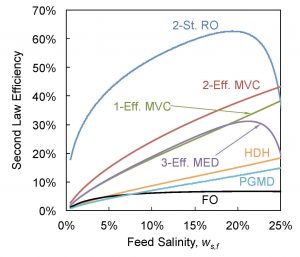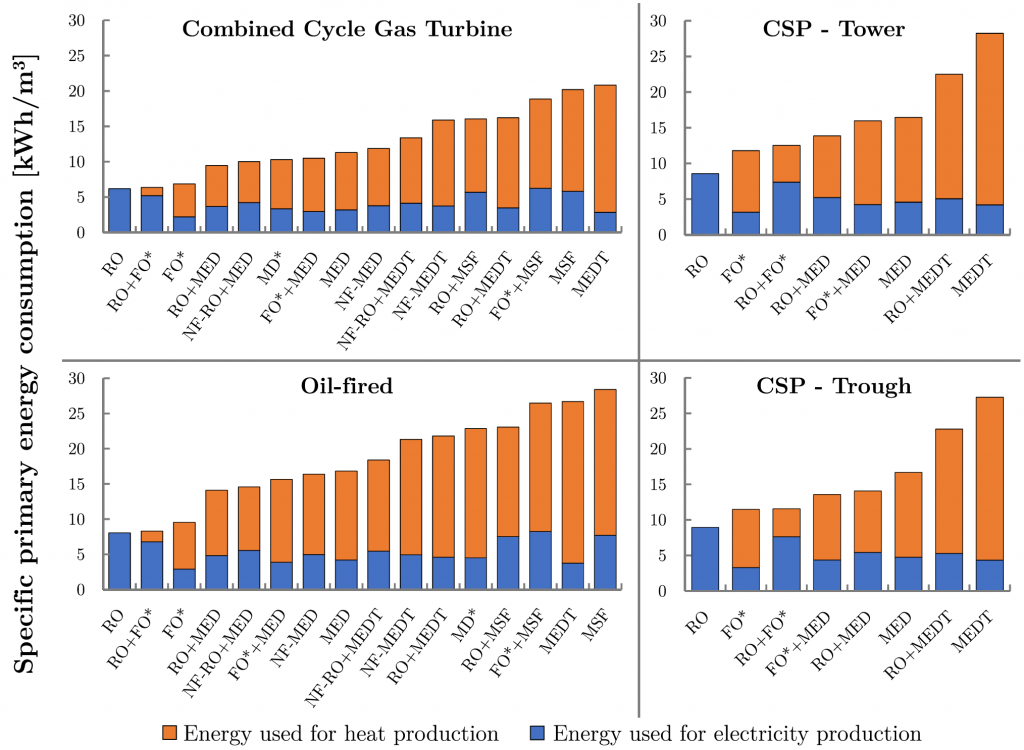Our research group has had a long-term interest applying rigorous thermodynamics to desalination technologies. We are interested in understanding the primary and secondary energy efficiency of these systems. We have approached these systems through both first-law and second-law analysis, including entropy generation and exergetic methods. Our interests have encompassed separations using evaporation, osmotic and pressurized membrane separations, and electrokinetic processes.
Selected Papers on Thermodynamic Analysis of Desalination Systems
A.T. Bouma, J. Swaminathan, and J.H. Lienhard V, “Metrics matter: accurately defining energy efficiency in desalination,” J. Heat Transfer, online 28 August 2020, 142(12):122101, December 2020. (doi) (preprint)
T. Altmann, J. Robert, A.T. Bouma, J. Swaminathan, and J.H. Lienhard V, “Primary Energy and Exergy of Desalination Technologies,” Applied Energy, online 17 June 2019, 252:113319, 15 October 2019. (doi link) (preprint) RO is the most efficient of a wide range of desalination technologies under fossil or solar primary energy.
J.H. Lienhard V, “Energy savings in desalination technologies: reducing entropy generation by transport processes,” J. Heat Transfer, online 17 May 17 2019, 141(7):072001, July 2019. (doi link) (preprint) This paper provides an overview of much of our work on balancing and equipartitioning.
J.H. Lienhard V, “Energy efficiency, primary energy, and apples vs. oranges,” IDA Global Connections, Winter 2019 issue, pp. 31–33. International Desalination Association. (PDF)
J.H. Lienhard V, K.H. Mistry, M.H. Sharqawy, and G.P. Thiel, “Thermodynamics, Exergy, and Energy Efficiency in Desalination Systems,” in Desalination Sustainability: A Technical, Socioeconomic, and Environmental Approach, Chpt. 4, H.A. Arafat, ed. Elsevier Publishing Co., 23 June 2017. (URL) (preprint)

A comparison of system efficiencies over varying feed salinities shows that the hypothetical high-pressure RO system generally outperforms existing produced water technologies (Thiel et al., 2015)
G.P. Thiel, E.W. Tow, L.D. Banchik, H.W. Chung, J.H. Lienhard V, “Energy consumption in desalinating produced water from shale oil and gas extraction,” Desalination, 366:94-112, 15 June 2015; online 15 January 2015. (doi link) (preprint) Several desalination systems are modeled at high salinity. While evaporative systems show increasing efficiency at higher salinity, high pressure reverse osmosis (HPRO), if realized, may provide significant energy savings relative to thermal technologies.
R.K. McGovern and J.H. Lienhard V, “On the potential of forward osmosis to energetically outperform reverse osmosis desalination,” J. Membrane Sci., 469:245-250, Nov. 2014. (doi link) (preprint) Reverse osmosis has a significant energetic advantage over forward-osmosis systems for seawater desalination.
K. Mistry and J.H. Lienhard V, “Generalized least energy of separation for desalination and other chemical separation processes,” Entropy, 15(6):2046-2080, May 2013. (OPEN ACCESS)
K.H. Mistry, R.K. McGovern, G.P. Thiel, E.K. Summers, S.M. Zubair, and J.H. Lienhard V, “Entropy generation analysis of desalination technologies,” Entropy, 13(10):1829-1864, Sept. 2011 (OPEN ACCESS). Received Best Paper Award
